|
|
|
Sort Order |
|
|
|
Items / Page
|
|
|
|
|
|
|
| Srl | Item |
| 1 |
ID:
168565
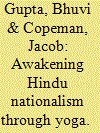

|
|
|
|
|
| Summary/Abstract |
Alongside Prime Minister Narendra Modi, whose politics he explicitly endorses, Swami Ramdev is frequently depicted as the contemporary face of neo-Hindutva nationalism in India. This essay concerns specific, but interrelated, aspects of the Swami Ramdev ‘phenomenon’ and their particular relation to Hindu nationalism. We bracket the headline-stealing anti-Islamic and pro-Modi proclamations in order to focus on the nuances of the relationship between his yoga and a majoritarian Hindutva agenda and examine the specifics of Ramdev’s teachings and campaigns. We suggest that the (Hindu) nationalism of Ramdev and his organisations is formed less of propositional or even affective content but instead is a condition emerging from its particular prescription and practice of yoga; it is a condition of the body. In this way, yoga, as it is reproduced at the site of the individual body, produces the national(ist) activist subject.
|
|
|
|
|
|
|
|
|
|
|
|
|
|
|
|
| 2 |
ID:
092653


|
|
|
| 3 |
ID:
142835
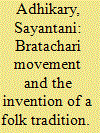

|
|
|
|
|
| Summary/Abstract |
The Bratachari movement, officially inaugurated in 1934, was shaped by the bodily anxieties of educated middle-class Bengalis and aimed at the all-round development of the body, mind and soul through the invention of a specific tradition. Though the founder of the movement, Gurusaday Dutt, attempted to construct a ‘martial’ genealogy for the ‘effeminate’ Bengalis through adequately ‘masculine’, ‘indigenous’ folk dance forms, the ideology around which the movement was built was not entirely ‘indigenous’. Indeed, it seemed to borrow from the English agenda of the revival of folk traditions and the German idea of Volksgeist to a large extent.
|
|
|
|
|
|
|
|
|
|
|
|
|
|
|
|
| 4 |
ID:
155051
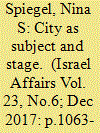

|
|
|
|
|
| Summary/Abstract |
This article investigates the impact of dance on the development of Tel Aviv during the British Mandate of Palestine. It shows how theatrical, salon, and folk dance forms shaped the culture as well as the physical space of the burgeoning city, and how national ideas were encoded into this nexus. The city served as both stage and subject of dancing and choreographic activity.
|
|
|
|
|
|
|
|
|
|
|
|
|
|
|
|
| 5 |
ID:
155120
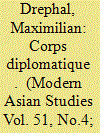

|
|
|
|
|
| Summary/Abstract |
This article studies diplomatic history in its physical dimensions. Its point of departure is the interpretation of the term ‘corps diplomatique’ in a literal sense. The article introduces the concept of the diplomatic body as a diplomat's body and as a body with diplomatic functions and meanings. Based on material relating to the British Legation in Kabul from 1922 until 1947, the body's ubiquity in international relations is revealed through the themes of space, language, and medicine. The article first looks at the impact of Kabul's spatial conditions and the physical reactions it excited in British diplomats. It then considers the bodies of Afghanistan's ruling elite as objects of British attention, whose appearance was documented in diplomatic records. Descriptions of these bodies in diplomatic language expressed intimacy and consensus as well as estrangement in British–Afghan relations. In addition to the metaphorical use of the diplomatic body, the provision of healthcare through the Legation's medical unit addressed the needs of British and Afghan bodies alike. It was also employed to further diplomatic ends by extending colonial medicine to the Afghan population. The study of the Legation's physical practices ultimately reveals the diplomatic mission's colonial origins and character.
|
|
|
|
|
|
|
|
|
|
|
|
|
|
|
|
| 6 |
ID:
178690
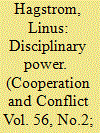

|
|
|
|
|
| Summary/Abstract |
This article draws on identity construction, emotions and a notion of productive power to address the question of why Swedish policymakers and public opinion are becoming increasingly supportive of NATO membership. It contributes theoretically by arguing that such textual phenomena intertwine with ‘disciplinary power’, which operates on the bodies of the subjects of power, exposing them to verbal and physical sanctions, a host of complex feelings and enhanced levels of self-disciplining. The article analyses 354 editorials and op-eds related to Sweden and NATO, published in the four biggest Swedish newspapers in 2014–2018; 1408 tweets, with a focus on 14 selected NATO campaigners and their advocacy; and semi-structured interviews with 12 such influencers. It concludes that Swedish NATO campaigners produce and negotiate emotional discourses in a way that targets other influencers and potential influencers by exposing them to ridicule and allegations of treason. While tendencies are similar on both sides of the debate, the article demonstrates that productive power currently intertwines with disciplinary power in a way that makes anti-NATO advocacy seem more fraught with personal risk than pro-NATO campaigning, and joining NATO appear to be the most normal, realistic and responsible policy option.
|
|
|
|
|
|
|
|
|
|
|
|
|
|
|
|
| 7 |
ID:
173950
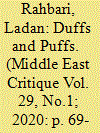

|
|
|
|
|
| Summary/Abstract |
In Iran, the politically sanctioned discourses of embodiment and body management are based on binary notions of gender and sexuality. These discourses are contested by social trends that reflect political dissent. This article uses a combination of content and visual analysis of three Instagram profiles dedicated to fashion to answer the question: ‘Is queer fashion present in Iranian cyberspace’ and if so, ‘How does it persist against the existing queer-phobic political forces?’ The article explores aesthetic and fashion categories called ‘duffs’ and ‘puffs’ that offer queer embodied extravaganza in Iranian cyberspace, which is a more relaxed geography of morality and leisure in comparison with offline public spaces. The analysis includes duffs and puffs’ life style and performance that entails excessive deployments of femininity and masculinity, and exploration of their political significance and potential to undo gender norms in Iran. While they do not explicitly reject heteronormativity and/or capitalism, their non-participation in the conventional modes of money-making, and their erotic and sexual performance contributes to transformative politics. They offer antagonism to the normative power of mainstream gender and sexual ideologies by staining their heterogeneity through performances of fun, shock and failure.
|
|
|
|
|
|
|
|
|
|
|
|
|
|
|
|
| 8 |
ID:
179010
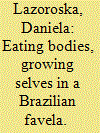

|
|
|
|
|
| Summary/Abstract |
The economic growth of Brazil in the early and mid-2000s has created opportunities for people like my interlocutors, the young and media-savvy residents of Brazilian favelas to consume and partake in a global market of the production of the self. These have nourished their pursuit for both diversity and difference and shaped the eclectic qualities of their consumption practices. In its plural forms, consumption, or eating, which will take center stage in this article, has enabled an expanded palette and palate of being, acting and relishing life in the favela. I argue that eating can be understood as a method of becoming; it can be used as an active attempt at asserting agency over one’s body and, by extension, at asserting subjectivity in a lifeworld open to multiple dimensions of uncertainty and insecurity.
|
|
|
|
|
|
|
|
|
|
|
|
|
|
|
|
| 9 |
ID:
106439
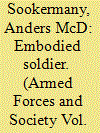

|
|
|
|
|
| Publication |
2011.
|
| Summary/Abstract |
The transformation of the Armed Forces is changing our understanding of what good soldiering skills are. The ongoing (post) modernization process aims to develop military communities of practice that are ready, willing, and able to serve and fight anyone, anywhere, and anytime on a regular basis. As a consequence, many Western countries such as Norway are witnessing a radical shift from an invasion defense-based concept grounded on conscription toward a more flexible expeditionary force-based defense concept that emphasizes professionalism. As such, it follows the typology of a change from a modern to a postmodern military. The understanding of the soldier as a human body is of great interest in this context since it is the individual (the soldier) who is to bring this transformation to life through his or her military (bodily) actions/skills within the military community of practice of which he or she is a member. This study describes and interprets the consequences of the ongoing military transformation with regard to the view of the human body so as to better understand the epistemological foundation for good soldiering skills.
|
|
|
|
|
|
|
|
|
|
|
|
|
|
|
|
| 10 |
ID:
179516


|
|
|
|
|
| Summary/Abstract |
Ethnography is widely accepted to be an embodied and experiential form of knowledge production. Gender, in particular, shapes fieldwork, influencing relationships between participants and researchers, access, and observation, and intersecting with race, class, nationality, sexuality, and other identity categories. Building on a rich tradition of reflexive feminist scholarship that explores this intersectionality, this article discusses how my own corporeal transformation to a muscular powerlifter changed both the nature of my fieldwork relationships and my research strategies over the course of a decade of local engagement in El Salvador. Ultimately, I argue that the embodied consequences of fieldwork and their challenge to patriarchy must be undertaken alongside research participants. Together we are collectively re-imagining gender.
|
|
|
|
|
|
|
|
|
|
|
|
|
|
|
|
| 11 |
ID:
185593
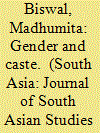

|
|
|
|
|
| Summary/Abstract |
Drawing from fieldwork on frontline health workers in villages in the state of Odisha, India, this paper critically interrogates the complex ways in which frontline health workers negotiate between their intersecting gender and caste identities and their roles as modern professionals at the village level. It argues that the embodied identities of these frontline health workers become crucial in shaping other villagers’ views on their labour. Frontline health workers from caste Hindu communities often claim that the spatial demarcation between public and private becomes a way out in resolving the conflicting demands posed by their professional roles and kinship obligations regarding caste practices. However, contrary to this claim, this article argues that such a neat demarcation of space remains unsettled in practice.
|
|
|
|
|
|
|
|
|
|
|
|
|
|
|
|
| 12 |
ID:
106553
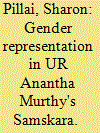

|
|
|
|
|
| Publication |
2011.
|
| Summary/Abstract |
Anantha Murthy's novel Samskara has achieved translated recognition nationally and internationally as a modern classic of Indian literature. Though it has generated much critical comment, insufficient attention has been given to its gender representation. Discussions of the novel's gender politics have either focused on its positive representations of feminine beauty and initiative or have taken a bleak view of its sexist arrangements. Re-scrutinising the novel's gender representation through culturally coloured lenses, this article uncovers other sites of gender discrimination and identifies a subtext that can offer a more positive inflection to Samskara's gender politics.
|
|
|
|
|
|
|
|
|
|
|
|
|
|
|
|
| 13 |
ID:
146983
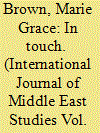

|
|
|
|
|
| Summary/Abstract |
When introducing the body as an interpretive framework, it has become almost cliché to cite poet and essayist Adrienne Rich's instruction that we “begin … with the geography closest in.” For well over a decade, scholars have addressed the body and its attendant intimacies as microsites for examining broad sociopolitical systems of race, gender, class, sex, empire, and nation. This focus on the body contributes to the ongoing feminist work of overturning the analytic dichotomy of public and private and has launched a much newer project of approaching our physical selves as historical subjects in their own right.
|
|
|
|
|
|
|
|
|
|
|
|
|
|
|
|
| 14 |
ID:
113236
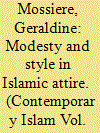

|
|
|
|
|
| Publication |
2012.
|
| Summary/Abstract |
My ethnographic fieldwork conducted with female converts to Islam in France and in Quebec (Canada) shows that, for these women, being Muslim does not necessarily mean wearing clothes with 'oriental' designs. Rather, they are starting their own clothing companies so as to produce distinct Muslim-Western fashions that they promote through the Internet. By interpreting Islam in a context where Muslims are a minority religious group, converts construct alternative religious and social representations of Muslim identity that accord with their feminist interpretation of the Qu'ran while simultaneously incorporating the Western background within which they were socialized. In this regard, the strategies that they develop for wearing the veil and for integrating into their environment (family, workplace, etc.) make it clear that fashion, religion and politics are interacting in multiple, creative ways. In this paper, I look at how new Muslim feminist subjectivities are produced and realized through habits of dress, resulting in new representations of the body. I explore this issue by considering dress and hairstyle strategies developed by Muslim converts, in order to examine new perspectives on the place of gender in religion as it relates to particular social contexts.
|
|
|
|
|
|
|
|
|
|
|
|
|
|
|
|
| 15 |
ID:
177938
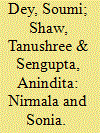

|
|
|
|
|
| Summary/Abstract |
In this article, we explore the duality and performativity of bodies as they move through multiple social, sexual and fiscal economies of Kolkata. We offer the story of Sonia, a middle-aged feminine man, who despite a number of obstacles within his family, experiments with a range of sexual identities, and in the process challenges the notion of conformist heteronormative trajectories in the city. Our second character, Nirmala, works as a commercial surrogate in Kolkata. Nirmala's story shows how the cultural script of the pregnant body, associated with heterosexual intercourse and motherhood, is defied by the renting of wombs for profit within the assisted reproductive sector in the city. The personal accounts of Sonia and Nirmala eventually tell a story of Kolkata itself. They underline its transition from older post/colonial economies towards neoliberal aspirations and gendered freedoms. These processes of change remain imprinted in the rebellious, unorthodox bodies of ordinary citizens.
|
|
|
|
|
|
|
|
|
|
|
|
|
|
|
|
| 16 |
ID:
145724
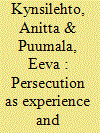

|
|
|
|
|
| Summary/Abstract |
This paper adopts an ontological perspective toward asylum interviews. The suggested take refers to the incompatibility of different knowledge systems and experienced worlds between asylum seekers and asylum officers. With such a focus, we sketch the parallel functioning of knowledge-claims anchored in two radically different ontological principles. Our analysis starts with the body as a site and source of knowledge through which we critically examine the limits of knowledge sought after in asylum politics. The ontological gap reflects the divide between meaning and significance, self and other, which this paper seeks to mediate through feminist methodologies and ethnographic insight. We suggest that asylum seekers do fill the ontological gap, but not in ways anticipated by governmental practices; their bodies and stories adopt alternative ways of identification and taking action. Thus, the gap is an opening for conceiving different knowledges and knowledge practices within asylum politics and international relations.
|
|
|
|
|
|
|
|
|
|
|
|
|
|
|
|
| 17 |
ID:
183712
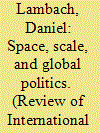

|
|
|
|
|
| Summary/Abstract |
Space matters for global politics but the treatment thereof in International Relations (IR) has been uneven. There is broad interest in spatial aspects across many research communities but only a nascent theoretical discussion and little cross-field communication. This article argues for a fuller engagement of IR scholars with sociospatial concepts and proposes a spatial approach to global politics based on four essential dimensions: a spatial ontology, the constructedness of space, a scalar perspective, and the interaction of materiality and ideas. As one possible way of integrating these aspects into a more specific concept, the article elaborates a framework of spatial practices and uses the example of Arctic Security research to illustrate the upsides of such a spatial approach for IR research.
|
|
|
|
|
|
|
|
|
|
|
|
|
|
|
|
| 18 |
ID:
137512
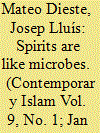

|
|
|
|
|
| Summary/Abstract |
This article analyses the revitalisation of Islamic exorcism in Morocco since the 1990s and how its practitioners legitimise it as a ritual largely adapted to theological orthodoxy. The rhetoric of these exorcists on spirit possession defines certain afflictions as an intromission of the genies (jnun) into the body by physical mechanisms, comparable to the processes undertaken by microbes. From interviews and observation of ritual exorcism of Moroccan faqihs in Tetuan and Barcelona, I analyse their techniques and the way they legitimise them. I conclude that the moral intervention of religious specialists through Koranic recitation becomes effective throughout a dynamic worldview that reinforces old basic assumptions about a physical intercourse between jnun and humans. At the same time, with the revitalisation of the ritual, many Koranic exorcists incorporate new rhetorics to demonstrate scientifically the materiality of the jnun and their effects on the possessed bodies. But Moroccan Koranic healers not only rework definitions of affliction and legitimise the physical agency of the jnun, they also contribute to define gendered experiences of the body as far as women are conceived as the favorite and weakest victims of the genies.
|
|
|
|
|
|
|
|
|
|
|
|
|
|
|
|
| 19 |
ID:
113849


|
|
|
|
|
| Publication |
2012.
|
| Summary/Abstract |
This article challenges International Relations to turn its view of war around and start not with states, militaries, strategies, conventional security issues or weapons, and not with the common main aim of establishing causes of war. The challenge is to conceptualise war as a subset of social relations of experience, on the grounds that war cannot be fully apprehended unless it is studied up from people who experience it in myriad ways and not only down from abstract places of International Relations theory. To study war as experience requires that the body come into focus as a unit that has war agency and is also a prime target of war violence. It also requires exploration of the concept of experience. Using an exemplary texts approach, the article briefly reminds us where the field is in its war concerns, before noting work on contemporary wars conducted under the flag of feminist International Relations, where experience and bodies have always been front and centre, and where a social war studies emphasis is developing. The discussion then raises definitional complexities that must be addressed and suggests areas where various International Relations traditions could collaborate with feminist International Relations and fields like anthropology to study the social relations of war.
|
|
|
|
|
|
|
|
|
|
|
|
|
|
|
|
| 20 |
ID:
158425
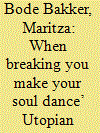

|
|
|
|
|
| Summary/Abstract |
This article is based on a study of the Naturalz crew, a ‘breaking’ or breakdancing group in Quito, Ecuador. Breaking is commonly analysed as a subculture of resistance. We analyse two – often neglected – dimensions of this resistance: the significance of utopian aspirations and the role of the body in subjective transformation. We argue that participants enact utopian values in breaking, for instance by affirming the value of street life and people from the streets. Furthermore, we see that breaking leads to subjective transformation among its young practitioners and that the body plays a central role in this change of subject position. It is interesting that girls use breaking to rebel against dominant images of ideal womanhood, resulting in changes in gendered subjectivity. Hence, from disempowered, marginalised young people, breakers turn into determined agents with physical strength and emotional resilience.
|
|
|
|
|
|
|
|
|
|
|
|
|
|
|
|
|
|
|
|
|